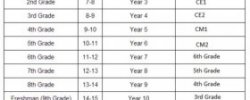Generally key stages 1 and 2 will be undertaken at primary school and at 11 years old a student will move onto secondary school and finish key stages 3 and 4.
Students are assessed at the end of each stage. The most important assessment occurs at age 16 when students pursue their GCSE's or General Certificate of Secondary Education. Once students complete their GCSE's they have the choice to go onto further education and then potential higher education, or finish school and go into the working world.
Our overview of the education system in the UK is divided into five main sections:
Primary education begins in the UK at age 5 and continues until age 11, comprising key stages one and two under the UK educational system. Please visit the British Council page for more information on primary education.
From age 11 to 16, students will enter secondary school for key stages three and four and to start their move towards taking the GCSE's - learn more about secondary education in the UK and what it will involve. Primary and secondary education is mandatory in the UK; after age 16, education is optional.
Once a student finishes secondary education they have the option to extend into further education to take their A-Levels, GNVQ's, BTEC's or other such qualifications. UK students planning to go to college or university must complete further education.
Probably the most important subject area on this site, this explains more about the higher education system in the UK and how it works for international students. Most international students will enter directly into the UK higher education system, after completing their home country’s equivalent to the UK’s “further education.”









